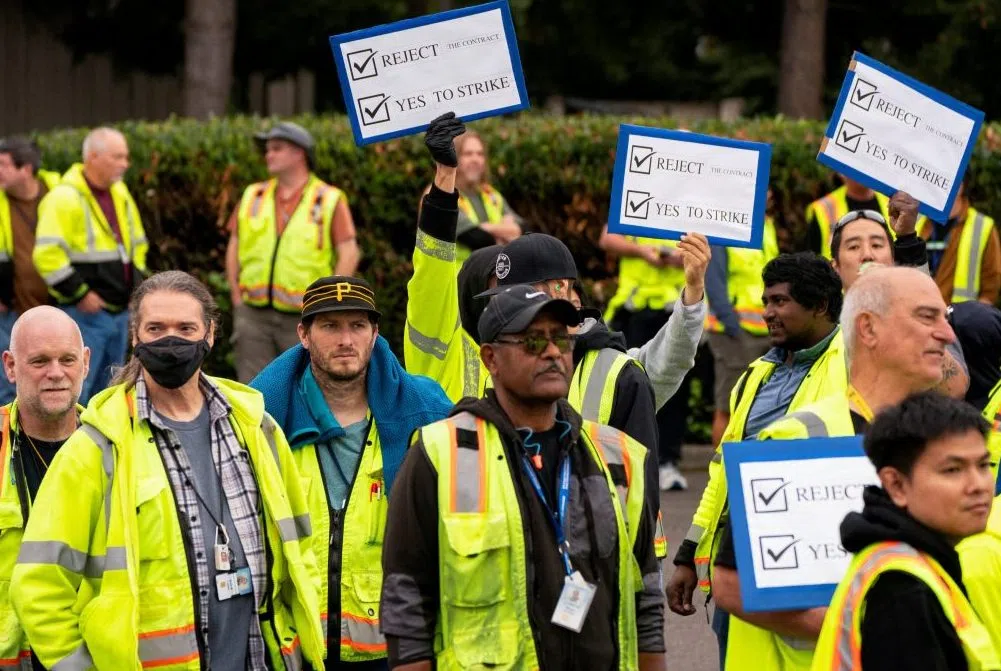SEATTLE (Reuters) -Boeing’s U.S. West Coast factory workers walked off the job early on Friday after overwhelmingly rejecting a contract deal, halting production of the plane maker’s strongest-selling jet as it wrestles with severe output delays and heavy debt.
The first strike since 2008 comes as the plane maker is under heavy scrutiny from U.S. regulators and customers after a door panel blew off a 737 MAX jet mid-air in January.
The mounting crises hit Boeing’s stock and sparked a leadership upheaval. The shares fell 2.8% in U.S. pre-market trading on Friday, paring some earlier losses. The stock has lost nearly 38% so far this year, losing $58 billion in market value.
Shares in Spirit Aerosystems, the supplier Boeing is buying, fell 1%.
New CEO Kelly Ortberg was brought in just weeks ago to restore faith in the plane maker and proposed a deal including a pay rise of 25% over four years, far lower than the 40% workers had demanded.
Roughly 30,000 International Association of Machinists and Aerospace Workers (IAM) members who produce Boeing’s top selling 737 MAX and other jets in the Seattle and Portland areas voted on their first full contract in 16 years, with 94.6% rejecting it and 96% favoring a strike in a two-part ballot.
“This is about respect, this is about addressing the past, and this is about fighting for our future,” said Jon Holden, who headed the negotiations for Boeing’s largest union, before announcing the vote result on Thursday evening. The union was going to get back to the table as quickly as it can, Holden told reporters, without saying how long he thought the strike would last or when talks would resume.
Boeing said in a statement that it was ready to get back to the negotiating table, a sign that it was ready to sweeten the deal.
“The message was clear that the tentative agreement we reached with IAM leadership was not acceptable to the members. We remain committed to resetting our relationship with our employees and the union, and we are ready to get back to the table to reach a new agreement,” the plane maker said in a statement.
A long strike could badly hit Boeing’s finances, which are already groaning due to a $60-billion debt pile.
Boeing had said it had offered workers everything it could and needs to plan for the investments needed to replace its best-selling single-aisle models while placating striking workers with a better offer.
BOEING’S CHALLENGES
The proposed deal included a $3,000 signing bonus and a pledge to build Boeing’s next commercial jet in the Seattle area, provided the program was launched within the contract term.
Data from equity research firm Melius Research showed median employee compensation for the aerospace and defense firms companies it monitors grew 12% between 2018 and 2023. It fell 6% for Boeing and 19% for Spirit Aerosystems.
“The key question now is on the duration of the strike given the gap between the proposed wage increase and union members request,” Jefferies analyst Chloe Lemarie said in a note, adding that a long strike poses a key risk for 737 MAX production.
Although IAM leadership recommended last Sunday that its members accept the contract, many workers responded angrily, arguing for the original demand and lamenting the loss of an annual bonus.
Workers have been protesting all week in Boeing factories in the Seattle area that assemble Boeing’s MAX, 777 and 767 jets.
On Friday, members in the union hall cheered and chanted “Strike! Strike! Strike!” and shortly after midnight, striking workers started to gather outside the entrances of Boeing factories in the Seattle area. Many waved placards that read: ‘On Strike Against Boeing’, and drivers passing by honked their car horns in support.
“I’m willing to strike for two months or even longer. Let’s go as long as it takes to get what we deserve,” said James Mann, a 26-year-old who works in a wings division at Boeing.
The Biden administration was in touch with both sides, White House press secretary Karine Jean Pierre said on Thursday. “We are going to encourage both parties to negotiate in that way, in good faith and reaching a strong contract,” she said.
STRIKE!
If prolonged, a strike would also weigh on airlines that depend on the plane maker’s jets and suppliers who manufacture parts and components for its aircraft.
The Boeing workers’ last strike in 2008 shuttered plants for nearly two months and hit revenue by an estimated $100 million per day. According to a pre-vote note from TD Cowen, a 50-day strike could cost Boeing $3 billion to $3.5 billion of cash flow.
CFM, the sole-source engine supplier for the 737 MAX, said there was no immediate impact to its operations.
Air India CEO Campbell Wilson said on Friday that Boeing’s 737 MAX deliveries to his airline appeared to be “delayed a little bit” even before the strike announcement because of regulatory scrutiny after the Alaska Airlines door incident and supply chain issues.
Cathay Pacific and flydubai said they were in touch with Boeing. A flydubai spokesperson said the airline was looking forward to Boeing swiftly resolving the issue and it was talking to the aircraft maker regarding the delivery schedule.
S&P Global Ratings said that an extended strike could delay Boeing’s recovery and hurt its overall rating. Both S&P and Moody’s rate Boeing one notch above junk status.
(Reporting by Joe Brock in Seattle, David Shepardson in Washington and Allison Lampert in Montreal; Additional reporting by Jamie Freed in Sydney, Lisa Barrington in Seoul, Medha Singh and Abhijith Ganapavaram in Bengaluru, Gabriella Borter in Washington; Writing by Jamie Freed, Peter Henderson and Sayantani Ghosh; Editing by Gerry Doyle, Elaine Hardcastle and Nick Zieminski)







Comments